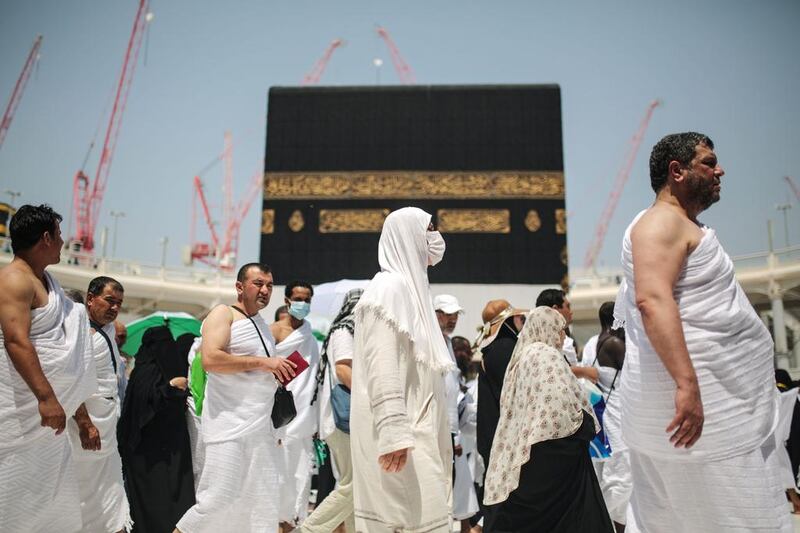Salman bin Abdulaziz Al Saud is the King of Saudi Arabia, the head of the House of Saud, prime minister, supreme commander of the armed forces, but, perhaps most importantly, Custodian of the Two Holy Mosques.
So when the Saudi foreign minister, Adel Al Jubeir, warned that any request to “internationalise” the management of Mecca and Medina would be a “declaration of war on the Kingdom,” it was because the move attempts to undermine one of Saudi Arabia’s key sovereign powers.
Any criticism of the management of the sites or the Hajj pilgrimage would be to challenge Saudi Arabia on what it views as both its duty and its right.
Mr Al Jubeir made the comments after a meeting in Manama by the quartet of countries boycotting Qatar, which they accuse of supporting extremist groups.
Saudi Arabia has always said that access to the holy sites of Mecca and Medina is the right of all Muslims regardless of their nationality or sect. Responsibility for the sites and the Hajj pilgrimage, which draws two million pilgrims annually, is also the kingdom’s most powerful form of political legitimacy.
That jurisdiction is particularly sensitive for Saudi Arabia as the previous calls for the kingdom to lose control of the sites have inevitably come from Iran seeking to capitalise on human tragedy.
_________________
Read more:
Council of Elders joins attack on 'politicised Hajj'
Saudi Arabia says Qatari statements on Hajj are a 'declaration of war'
Qatar crisis: What you need to know
_________________
In September, Ayatollah Ali Khameini, the Iranian supreme leader, said the “world of Islam must fundamentally reconsider the management of the two holy places and the issue of Hajj” a year after a crush killed hundreds.
Even more provocative were comments made in 1987 by Ayatollah Hussein Montazeri, who was once the designated successor to the then supreme leader. He suggested control of Mecca be wrested from Saudi’s royal family after 400 people died in clashes between Saudi police and Iranian pilgrims. The violence came after the pilgrims held a demonstration in Mecca after Friday prayers.
Iranian protests at the time were commonly seen as the precursor to Tehran’s attempt to export its revolution and realise Arabian Gulf nation’s fears of an overextension of Iranian influence. ‘Exporting the revolution’ has been a declared state policy of Iran since the 1979 revolution.
In the days that followed, protesters in Tehran stoned the French embassy, stormed the Saudi embassy and burned cars and documents belonging to diplomats.
Saudi responded to the attacks by cutting the number of Iranian pilgrims allowed to perform Hajj by two-thirds.
The history of Saudi Arabia is interlaced with the control, care and management of the holy sites.
Mecca and Medina were seized in 1916 during the Arab Revolt against the Ottoman empire. The very foundation of the modern state of Saudi Arabia came shortly after Abulaziz ibn Saud captured the cities from the Hashemites of Hejaz in 1924 and 1925. His coronation as King of Nejd came on January 8, 1926, and the formation of the Saudi Kingdom came a year later.
Before the House of Saud’s rise to power, Mecca and Hajj have been political tools which Islamic dynasties and colonial rulers utilised to centralise power.
Historically, controlling the holy sites came hand in hand with certain rights that are as global in nature as the pilgrimage itself.
By claiming to be “protector” of Hajj, whoever presided over Mecca would be able to export a form of soft power in the form of establishing caravan routes, fortresses and even Hajj offices in foreign lands.
In the Ottoman Empire, Turkish presence under the guise of guaranteeing safe pilgrimage was a legitimate and less provocative means to impose control while also attempting to win the hearts and minds of its Arab constituency.
Today, with Hajj offices around the world, being a custodian of the two holy sites of Mecca and Media is an important element of Saudi Arabia’s soft power. Regardless of politics, to be responsible for the holiest sites in Islam creates ties that bind it with 1.5 billion Muslims around the world.
The Saudi king’s role as Custodian of the Two Holy Mosques is his greatest responsibility – and he has always stressed it as so.
nalwasmi@thenational.ae





